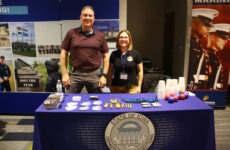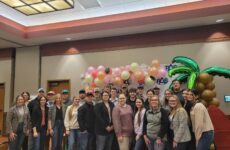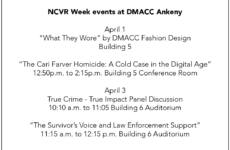On Jan. 27, Donald Trump signed an immigration ban that blocked people from Iraq, Syria, Iran, Sudan, Libya, Yemen, and Somalia from entering the country. He called it an act of “protecting the nation from foreign terrorist entry into the United States.”
Less than a day later, airports and social media accounts were flooded with protests. Green cards were revoked and people traveling overseas were scrambling to get home. Men, women, and children were separated and detained for hours on end. Lawyers showed up and worked pro-bono, or without pay, to help get people on and off of flights safely and with knowledge of their rights.
Individual judges began blocking the travel ban. On February 4, Federal Judge James Robart put a restraining order on the ban, making it invalid across the country.
On Feb 9, three judges with the U.S. Court of Appeals ruled against reinstating the immigration ban, something they have the authority to do because of the checks-and-balance system of our government. After, Trump took to Twitter and White House reporters to announce he would be taking the block back to court.
Looking at the ban from an education perspective, a lot is at stake. In a letter sent out Jan. 29, Harvard’s Drew Faust asked federal officials to look at the effect the ban would have on universities.
In an email sent out Feb. 1, President Rob Denson touched on the fact that DMACC values diversity and student-empowerment in education.
“With the recent national and international discussion about immigration, it is important to share with the students, faculty, staff, and members of the community that DMACC values our diverse learning community and appreciates the contributions that individuals from all cultures bring to our College and community. We welcome and value all students from all cultures and want them to feel supported as they live, learn, work, and socialize in our communities,” it said.
“Our mission is to provide quality, affordable, student-centered education and training designed to empower all students in their pursuit of life’s opportunities and career goals. We embrace students from around the world to become part of the DMACC community as we strive to fulfill our mission.”
According to the Boston Globe, the U.S. is home to over one million international students. Big universities are often made up of around 50 percent international professors. The immigration ban could not only limit international students’ willingness to study in the United States, but also discourage U.S. citizens from researching and traveling abroad.
Abel Tiony, a second-year DMACC pre-nursing student from Kenya, believes the “good news is it’s not taking people out.” He said, “It is frustrating, especially if you already had a visa or have something to go home for,” but he also said “I’m sure [Donald Trump] believes that what he’s doing is going to keep the country safe. It’s his job.”
Taha Gesalla, a DMACC Urban pre-med student from Sudan, moved to Iowa in July 2014 when his family won an immigration lottery. “We got this amazing opportunity to come here. It’s just luck, I think.”
He’s recently been accepted into a neurobiology program and plans on becoming a brain surgeon. “Schooling is my priority. When you say my name, it’s like my name. If you love your name, that’s how I love school. I have a deep passion to go to medical school here, finish my degree, and be a doctor to help humanity. I’ve had this dream since I was six years old, and the fact that I don’t know what’s going to happen to my future is very scary, it is. And it’s not just for me. It’s for a lot of young people.”
Before the ban went up, Gesalla had plans to visit home. Before the ban was blocked, he had concerns about how it would effect that. “I was going this summer to visit, because this is my last semester at DMACC before I head into my next journey and I thought I’m going to go see my friends and families up there and now I cannot. I cannot even move through the country; I don’t know what the situation will be. We are green-card holders, but I don’t know how that will fit into our situation.”
Neither Gesalla nor Tiony feel like the ban is an attack from the people of the United States themselves.
“Americans like to be viewed as good people. This doesn’t make them cool or good people,” Tiony said. He also said that he feels the world is “not seeing this as an American act. We are seeing it as a small group of narrow minds.”
“People, when they look at the United States, they feel that the United States is the leader of the world. Everybody waits for what the United States is going to say, but everybody’s scared of Donald Trump. They think he is an unqualified president, he doesn’t know what he’s going to do, the people around him who just clap for him don’t even know what he’s going to do. What’s he thinking about? It’s just scary. An unpredictable president, ” said Gesalla.
Despite the travel ban and the backlash on immigration across the country, Gesalla said that at DMACC, he’s had a lot of support. “We are a unity, we are a community. We have to support each other. If it doesn’t effect me, it effects somebody else. But people support me.
“My message to the young generation is keep hope in each other, keep hope that the system will save us from this trouble.”





Comments